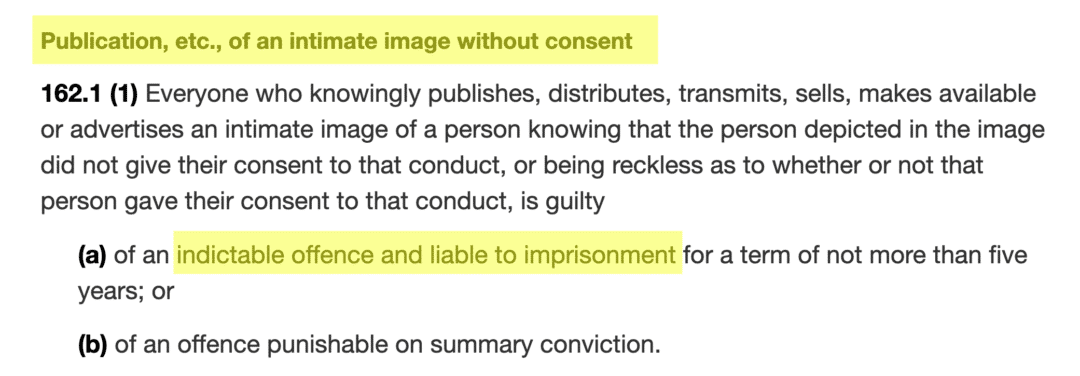

In Search of the Great Canadian Terror
by Matt Taibbi | May 10, 2024
For a more detailed take on the Online Harms Act, click here.
On Tuesday night America This Week co-host Walter Kirn and I were texting, as we often do at the end of busy news days. He sent this:

I remembered seeing something about Trudeau’s digital censorship bill on Michael Shellengerger’s Public site earlier this year, but the idea of police arresting people on the basis of retroactive searches apparently didn’t register. “No way,” I thought, silently cursing Twitter. But I clicked on the tweet by “Camus,” which linked to a People’s Voice article that quoted Czech historian Muriel Blaive of the Institute for the Study of Totalitarian Regimes at length. She called the bill “mad” and like Camus decried the retroactive punishment clause, which places a responsibility on Canadians (or visitors to Canada, as I’d learn) to delete any old statements on the Internet that may constitute illegal hate speech under the new bill.
Blaive noted, however, that while you can delete a past offense, the new Canadian law also punishes future or potential crimes. She wrote:
This is where it trips over into as yet unimagined dystopian territory. If the courts believe you are likely to commit a ‘hate crime’ or disseminate ‘hate propaganda’ (not defined), you can be placed under house arrest and your ability to communicate with others restricted… If the court believes there’s a risk you may get drunk or high and start tweeting under the influence — although how is unclear, given you can’t use your phone or a PC — it can order you to submit regular urine samples to the authorities. Anyone who refuses to comply with these diktats can be sent to prison…
This had to be a prank! I’d never heard of Muriel Blaive, nor her Institute (which does exist, as it turns out), but it seemed impossible that any democracy, even Justin Trudeau’s Canada, would seriously consider a law that could put people in jail for crimes they haven’t committed… yet? As Walter would point out later in the week, such a thing, if it existed, would represent a gap in George Orwell’s imagination. So why wasn’t there more coverage about a bill introduced in February?
Google only tells you so much. Official Canadian sites stressed the Online Harms Act created “stronger protections for kids” and “a new vision for safer and more inclusive participation online.” Initial CBC coverage was almost indistinguishable from that federal press release, quoting Justice Minister Arif Virani saying “We cannot tolerate anarchy on the Internet,” and “the mental health and even the lives of our kids are at stake.” Virani did concede in an interview with CPAC anchor Michael Serapio that there would be some speech concerns, but the bill “wasn’t about that,” but mainly focused on child protection, revenge porn, and other problems that surely were “uncontroverted,”
Sometimes outlets miss the fine print early. What about later? The Conversation, a generally sane site that features journalistically framed articles by academics, ran a piece a month after the bill’s release called “The Online Harms Act Doesn’t Go Far Enough to Protect Democracy in Canada.” The New York Times did a story that noted “Critics Say It Goes Too Far” in the headline, but said nothing about retroactive policing, pre-crime, or draconian penalties. It did have a quote from University of Calgary professor Emily Laidlaw: “It’s an incredibly thoughtful piece of legislation.”
The only mainstream American publication to reference the worst elements of the bill was a March 14 New York Post piece that hit the key notes of life imprisonment and pre-crime, while the piece by Stephen Moore on Public as far as I can tell is the first and probably only effort to put “life in prison” in a headline.
Then this week Elon Musk, in response to the same Camus tweet Walter sent, declared that the details in the bill sounded “insane if accurate”:
This sounds insane if accurate!@CommunityNotes, please check https://t.co/RB1Ea0upTk
— Elon Musk (@elonmusk) May 7, 2024
Musk’s tweet inspired a flurry of weirdly angry articles. The Independent somehow concluded that it “could find no evidence that the bill gives police new powers to arrest people for retrospective breaches,” noting that Elon frequently shares “dubious claims or theories.” But Canada’s more conservative National Post piece on Musk noted that Canadian author Margaret Atwood also called the bill “Orwellian,” and referenced “up to life imprisonment for hate-crime offences.” It also claimed to be quoting the bill in saying that “fears on reasonable grounds that another person will commit” a hate crime could result in detention. If that’s in the bill, how did so many other outlets ignore it?
I found the text of the bill, saw the Post quoted it accurately, then reread from the start. By the text, Camus, Blaive, and Moore seemed correct, and it also seemed clear the New York Times, the CBC, The Conversation, the Globe and Mail and others buried the lede in coverage of the bill, which twice uses the term “imprisonment for life” and also references two, five and ten year sentences. There’s no way to read the bill and the Canadian coverage especially and conclude anything but that the more extreme provisions were deliberately played down.
The Globe and Mail, for instance, ran an article specifically about the “controversial” criminal provisions, but avoided mentions of “life” or “ten years” and said only that it “includes changes to the Criminal Code to usher in stiffer penalties for hate-related crimes.” A piece on the McGill University website quoted one of its law professors saying “the bill should remove its criminal law provisions, as we don’t have evidence that longer prison sentences lead to safer practices,” but with typical Canadian reserve avoided the neon headline material, i.e. the “imprisonment for life” line.
Embarrassed I’d missed all of this, I put out an APB for Canadian lawyers. After speaking with Bruce Pardy of Rights Probe, self-described “accidental” civil liberties lawyer Daniel Freiheit (I’ll let him tell you to whom he’s related), and two Toronto-based attorneys who didn’t want to be quoted, I got the impression that there was significant concern, even shock about this bill in the Canadian legal community that was clearly not being reflected in mainstream coverage. Walter and I decided to do an episode on the subject. Not until after we recorded, however, did I have a conference call with four other attorneys, who explained a portion of the bill I hadn’t seen anyone explore in print: a bizarre take on the American “hate crime enhancement” concept that would allow authorities to push for “imprisonment for life” for violating any “Act of Parliament” with hateful intent.
Canada rarely doles out life prison terms for murder, but C-63, it seemed, was imagining life for offenses that weren’t even crimes, so long as they’re committed with hateful intent. (I’ve heard conflicting opinions on what the “Act of Parliament” clause means, but several attorneys insisted it could include something as trivial as littering.) Add a fuller expanation of the financial rewards of up to $20,000 for snitching (the bill uses the term “informant” twice), combined with penalties up to $50,000 for the accused, and it seemed no one outside of Ezra Levant’s perpetually downranked Rebel News had given all the scary elements of the bill real coverage.
Those articles on Levant’s site, which is almost never mentioned in American media without the prefixes “far right” or “extremist right” and almost never appear in early Google searches, are also the only ones I’ve seen so far that report the seemingly crucial fact that many of the child protection and/or pornography provisions that got the most official coverage appear to already be against the law in Canada. The angles sold by Trudeau and Justice Minister Arif Verani about protecting children and making hate offenses criminal are mostly all on the books already.
“Revenge porn has been against the law in Canada for 10 years,” Levant, a lawyer, sighs. The new law seems to create an additional responsibility for platforms to remove such content, but that it’s been illegal since 2015 is not in doubt:
I tell this story for two reasons. One is just to illustrate that in the current media environment, there is often now no way to know what the hell you’re dealing with without picking up the telephone. The alleged most reputable media outlets in Canada and the U.S. refused to touch the most sensitive parts of this bill. Again, it’s hard to avoid the conclusion that many did so intentionally, among other things because some reference parts of quotes or text but tiptoe around nearby key terms like “life,” “$50,000,” “$20,000,” “will commit,” “continuous communication,” and “so long as the hate speech remains public.” I’m still curious about the “Act of Parliament” clause — Virani insists an “offence motivated by hatred” refers to “criminal” offenses — but there’s no question that most of this law has been aggressively non-reported in the mainstream press, portrayed as just another in the growing jumble of European and anglophile “anti-disinformation” laws like the EU’s Digital Services Act.
The other reason is to explain; more is coming. Under normal circumstances a feature on a topic like this should include discussion of cultural pressures driving the bill, the recent changes in Canadian law that make it possible, examination of the political motives of Trudeau and his bizarre transformation into a global spokesmodel for the new authoritarianism, and so on. But we wanted to discuss this craziness on America This Week, so the article that’s out the door is mostly an effort to fact-check and explain some of the basics. Especially in conjunction with our own House passing its recent antisemitism bill (a big boundary-breaker in the realm of banning state-defined political speech if it goes all the way), this looks like an important story that needs watching as a potential model for a ghastly new type of surveillance state. Let’s hope not, but it might be. Until then, whatever happened to old, harmless, Terrance-and-Phillip Canada? We need this just over the border?






0 Comments